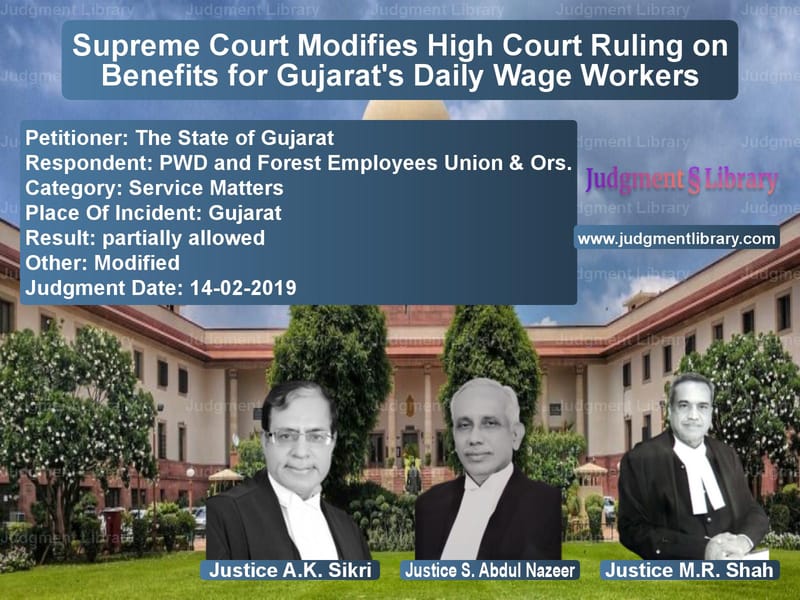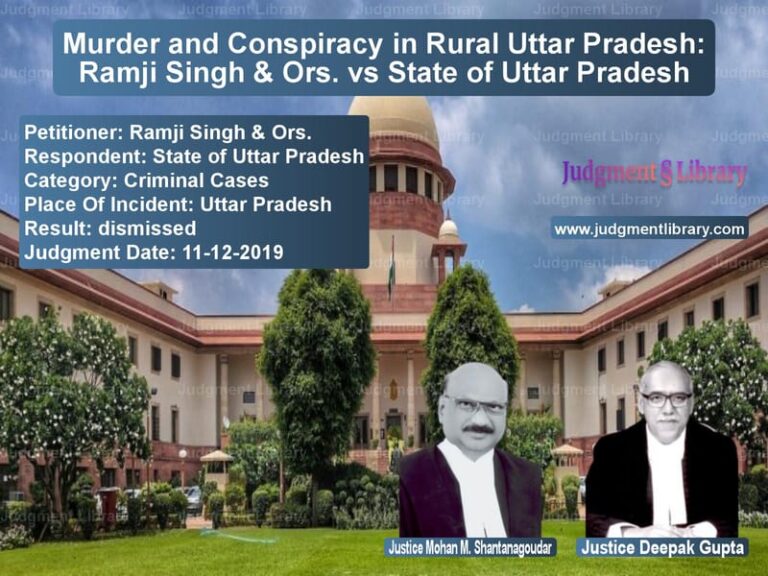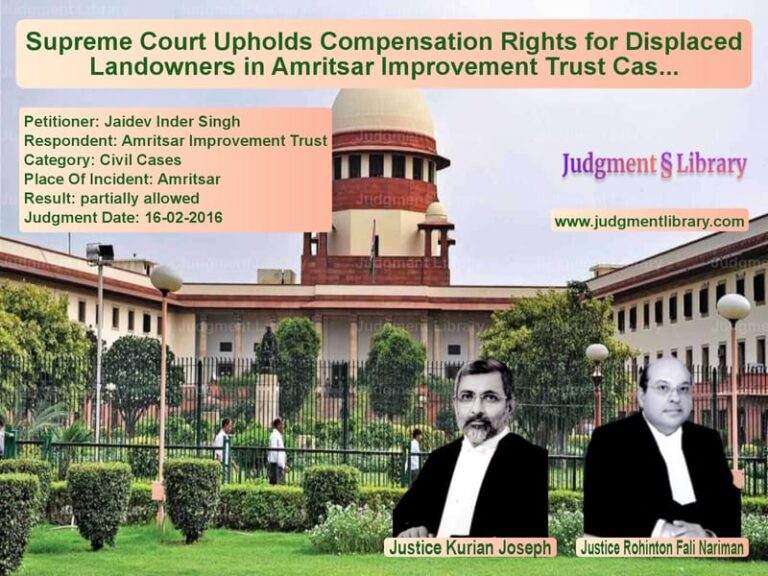Supreme Court Modifies High Court Ruling on Benefits for Gujarat’s Daily Wage Workers
The Supreme Court of India has delivered an important ruling in the case of The State of Gujarat vs. PWD and Forest Employees Union & Ors., modifying the Gujarat High Court’s decision regarding benefits for daily wage workers in the state’s Forest Department. The judgment reaffirms that daily wage workers are entitled to benefits, but with certain clarifications to ensure fairness and alignment with government policies.
Background of the Case
The case involves daily wage workers employed in the Forest Department of Gujarat. In 1988, the Gujarat government issued a Government Resolution (GR) granting benefits to daily wage workers in various departments, but the Forest Department workers were excluded. The employees’ union challenged this exclusion, and after years of litigation, the Supreme Court ruled in State of Gujarat & Ors. v. PWD Employees Union & Ors. (2013) that these workers should receive similar benefits.
However, when the Gujarat government implemented the ruling in 2014, the employees’ union filed a contempt petition, arguing that the new resolution did not fully comply with the Supreme Court’s directives. The Gujarat High Court agreed and directed the state to grant benefits as per the 1988 resolution. The state government then appealed to the Supreme Court.
Legal Issues in the Case
- Whether the benefits granted to daily wage workers in 2014 were in line with the 1988 resolution.
- Whether the Gujarat High Court was correct in its interpretation of the Supreme Court’s 2013 ruling.
- Whether the Supreme Court should modify the benefits granted to daily wage workers.
Arguments Presented
Appellant’s (State of Gujarat) Arguments
- The 2014 resolution was designed to implement the Supreme Court’s ruling while maintaining uniformity in benefits across all government departments.
- Providing benefits exactly as per the 1988 resolution would create discrepancies between Forest Department workers and workers in other departments.
- Regular employees were receiving lower pay scales than what daily wage workers would get if the 1988 resolution was applied directly.
- The state had substantially complied with the Supreme Court’s directions and should not be held in contempt.
Respondents’ (PWD and Forest Employees Union) Arguments
- The 2014 resolution diluted the benefits granted by the 1988 resolution.
- Daily wage workers in other departments received better benefits, creating an unfair distinction.
- The Gujarat High Court correctly ruled that the state must grant benefits in full compliance with the Supreme Court’s 2013 ruling.
- The new resolution was not in “consonance” with the previous Supreme Court ruling and was an attempt to avoid full compliance.
Supreme Court’s Observations and Judgment
1. Implementation of Benefits
The Supreme Court clarified that while the benefits of the 1988 resolution should be extended to daily wage workers, they must be aligned with existing government pay structures. The Court ruled:
“Daily wage workers who attain permanent status cannot receive higher pay than regular employees performing the same duties. Government pay rules must be followed for uniformity.”
2. Modification of Pension and Provident Fund Benefits
The Court ruled that workers who attained permanent status before April 1, 2005 would be entitled to benefits under the General Provident Fund (GPF) scheme, while those who became permanent after this date would be covered under the Contributory Pension Fund (CPF) scheme.
“Employees regularized before April 1, 2005, will be governed by the earlier pension scheme, while those regularized afterward will fall under the CPF scheme.”
3. Leave and Other Benefits
The Court ruled that the leave entitlement for daily wage workers should match that of regular government employees, meaning they were entitled to 12 days of casual leave and 2 days of voluntary leave, instead of 14 days of casual leave.
4. Criteria for Counting Years of Service
The Court ruled that only those years in which an employee worked at least 240 days should be counted toward service benefits.
“Only those years where the worker completed 240 days or more in a year shall be counted for calculating service benefits.”
5. Pay Scale Adjustments
The Court held that while daily wage workers were entitled to fair wages, their pay scales should be aligned with those of regular government employees, to prevent anomalies.
Final Judgment
The Supreme Court:
- Modified the Gujarat High Court’s ruling to align with government pay structures.
- Directed the state to implement the revised benefits within two months.
- Clarified pension and provident fund rules for pre- and post-2005 regularized workers.
- Restricted service counting to years where 240 days of work was completed.
- Limited casual leave entitlement to 12 days, aligning with regular government employees.
Legal Implications of the Judgment
This ruling has important consequences for labor law and government employment policies:
- Ensures uniform pay structures: Daily wage workers cannot receive higher salaries than regular employees.
- Clarifies pension eligibility: Distinguishes between pre- and post-2005 regularized workers.
- Reinforces service calculation rules: Only years with 240+ days worked will be considered.
- Standardizes leave policies: Daily wage workers get the same leave entitlements as regular employees.
Conclusion
The Supreme Court’s ruling in The State of Gujarat vs. PWD and Forest Employees Union & Ors. brings much-needed clarity to the issue of benefits for daily wage workers. While ensuring that they receive fair treatment, the judgment also prevents unfair pay disparities between permanent and temporary workers. By modifying the Gujarat High Court’s ruling, the Supreme Court has provided a balanced solution that respects both workers’ rights and government employment policies.
Petitioner Name: The State of Gujarat.Respondent Name: PWD and Forest Employees Union & Ors..Judgment By: Justice A.K. Sikri, Justice S. Abdul Nazeer, Justice M.R. Shah.Place Of Incident: Gujarat.Judgment Date: 14-02-2019.
Don’t miss out on the full details! Download the complete judgment in PDF format below and gain valuable insights instantly!
Download Judgment: The State of Gujarat vs PWD and Forest Emplo Supreme Court of India Judgment Dated 14-02-2019.pdf
Direct Downlaod Judgment: Direct downlaod this Judgment
See all petitions in Employment Disputes
See all petitions in Pension and Gratuity
See all petitions in Public Sector Employees
See all petitions in Judgment by A.K. Sikri
See all petitions in Judgment by S. Abdul Nazeer
See all petitions in Judgment by Mukeshkumar Rasikbhai Shah
See all petitions in partially allowed
See all petitions in Modified
See all petitions in supreme court of India judgments February 2019
See all petitions in 2019 judgments
See all posts in Service Matters Category
See all allowed petitions in Service Matters Category
See all Dismissed petitions in Service Matters Category
See all partially allowed petitions in Service Matters Category







